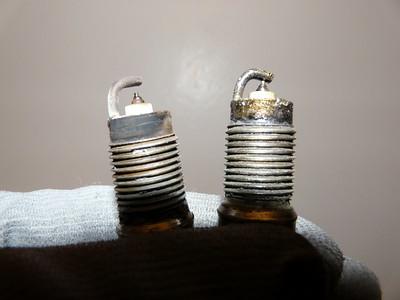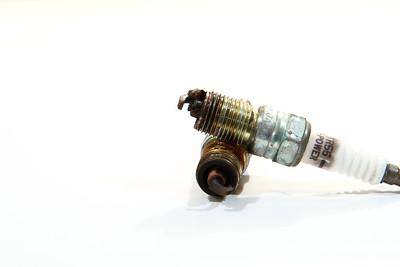Yes, bad spark plugs can cause a lean condition in your vehicle’s engine. The lean condition occurs when the air-fuel ratio is too high and there is an inadequate amount of fuel supplied to the engine. Bad spark plugs can cause misfires, which can prevent the engine from getting the fuel it needs to run. This means that the spark plugs may not be providing enough spark to ignite the fuel, leading to an insufficient burn and a lean condition.
Furthermore, the spark plugs can become fouled by deposits or wear down due to age, which can further impede their ability to spark efficiently and cause a lean condition. It is important to check your spark plugs regularly to ensure that they are in good condition and to prevent a lean condition
What Does It Mean by Lean Condition?
A lean condition in your vehicle’s engine can spell trouble for its performance and the environment. It occurs when there is an excess of oxygen relative to the fuel inside the combustion chamber, resulting in insufficient combustive power – this causes a signal from the O2 sensor to be sent back to your car’s PCM (Powertrain Control Module). This issue manifests itself through diagnostic troubleshooting codes which should alert you that it’s time for inspection by a qualified professional.
Can Bad Spark Plugs Cause Lean Condition?

It’s important to understand the difference between a lean and rich engine condition. While an engine running in a “lean” state has too much air and not enough fuel, when it runs in a “rich” configuration there is more fuel than necessary for optimum performance. This can lead to incomplete combustion of fuel which causes decreased efficiency, reduced power output, and higher emissions from the exhaust system.
A spark plug is essential to the proper burning of fuel in an engine; a bad or inefficient one can lead to excess fuel consumption. But even with a lean condition, it’s not necessarily true that this will be evidenced by white or clean plugs – they are only symptoms rather than causes of such issues.
1. Symptoms of a Lean Condition
A lean condition of the spark plug is a common issue in engines, and it is important to recognize its symptoms in order to identify and remedy the issue. The spark plug is a crucial component in the combustion process, and if it is not operating properly, the engine can suffer from a decrease in performance or even a complete breakdown. Symptoms of a lean condition of spark plug include a decrease in power output, increased fuel consumption, and slower acceleration rates. The engine may also produce a loud knocking sound and produce visible smoke from the exhaust pipe.
2. Causes of a Lean Condition
A lean condition of the spark plug can be caused by a variety of factors. First, fuel pressure may be too low, causing a lack of fuel in the cylinders. This could be due to a fuel pump malfunction, a clogged fuel filter, or a defective fuel pressure regulator. Another cause could be an intake leak, which may be due to a worn or loose intake manifold gasket or a cracked intake manifold. Additionally, inadequate fuel injector pulse width can cause a lean condition. This could be caused by a malfunctioning fuel injector, a malfunctioning fuel injection control module, or a wiring issue. Finally, a vacuum leak, either in the intake manifold or in the evaporative emission system, can also cause a lean condition.
How Bad Spark Plugs Can Lead to a Lean Condition
Spark plugs are one of the most important components of any internal combustion engine and can have a significant impact on engine performance. Poorly functioning spark plugs can lead to a lean condition, which is when the engine receives an insufficient amount of air-fuel mixture.
This can cause an array of engine issues, such as misfiring, increased fuel consumption, and decreased power output. Furthermore, prolonged operation in a lean condition can lead to expensive repairs, such as replacing the spark plugs and other components like the fuel injectors.
To prevent this from happening, it is essential to ensure that spark plugs are in good working order and regularly inspected for any signs of wear or damage. If necessary, they should be replaced to maintain engine performance.
How to Fix a Lean Condition Caused by Bad Spark Plugs
If you suspect that your vehicle is having a lean condition caused by bad spark plugs, you can take the following steps to effectively diagnose and fix the issue.
First, check the spark plugs for any signs of wear or damage. If the spark plugs are visually worn out, it is likely that they need to be replaced. However, if the spark plugs appear to be in good condition, it may be necessary to perform a compression test to determine if there is an internal engine issue causing the lean condition.
Once you have determined the source of the issue, you can proceed with fixing it. If the spark plugs are worn out or damaged, they will need to be replaced with new ones. You should make sure that the spark plugs are always in a good condition.
What Are Engine Running Lean Causes?

1. Fuel Pump Failure
Ensuring the proper functioning of your fuel pump can save you time and money in unexpected repairs. Keeping at least ¼ tank of gas will help keep the essential circuits in your engine unclogged, preventing any lean conditions that would otherwise be caused by a malfunctioning fuel pump.
2. Vacuum Leak
Even the smallest gap in your vehicle’s vacuum hoses can cause significant disruptions to fuel distribution, resulting in a misfiring engine and unmeasured air entering the motor. In turn, this imbalance between intake of air and burn of fuel makes it difficult for engines to properly utilize resources – leading to decreased performance overall.
3. Oxygen Sensor Malfunction
Malfunctioning oxygen sensors in modern vehicles have the potential to supply false data to the ECU, leading it astray into providing an insufficient amount of fuel. However, thankfully this problem is easily solved by a quick repair job on any faulty sensor.
4. Clogged Fuel Filter
Poor fuel economy and engine performance can often be attributed to clogged fuel filters. A small speck of dirt is enough for the injectors to become blocked, so it’s important we maintain a clear flow in our gasoline lines; however, if this fails then utilizing an effective cleaner or paying out large sums could solve the issue.
5. Faulty MAF sensor
The MAF sensor plays an important role in computing optimal intake airflow and relaying vital information to the computer. When malfunctioning, it can cause a cascade of problems such as too little or excessive fuel entering the engine leading to the combustion chamber running lean.
FAQ
What will happen if your spark plug is lean?
Too little or too much air in the fuel mixture can have serious consequences for your engine. An imbalance of gas to air can cause unusual firing, fouling, knock, and even pre-ignition – all things that you want to avoid when it comes time for ignition.
Can a misfire cause a lean condition?
When one cylinder is imprecise or fails, the engine can experience difficulties in maintaining optimal function. As it strives to compensate for this failure, an imbalance of fuel and air may be introduced resulting in either a rich or lean operating condition.
Will running lean cause overheating?
Working with a modified racing car can be thrilling, but a vital advice is needed to help ensure success. An old-school tip of “running lean equals dying rapidly” may sound simple, yet it fails to convey the complexity behind keeping such engines running optimally in extreme conditions.
What are the symptoms of a lean fuel mixture?
An enriched fuel blend may impede an engine’s ability to start, as the lack of proper fuel reaching the combustion chamber can cause a variety of issues. An indicator that this is happening could be difficulty cranking – something all car owners should bear in mind.
Conclusion
Understanding what a lean condition is and how it affects your vehicle is essential for keeping your car running at its best. Lean conditions can cause a wide range of issues, from decreased engine performance to increased emissions, so it’s important to take preventive measures to avoid them. Regular maintenance, such as making sure your air filter is clean and checking for any air leaks, can help you avoid a lean condition and keep your car running smoothly.

